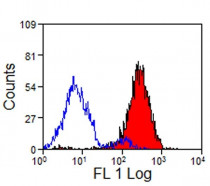ARG23369
anti-CD14 antibody [MIL2]
anti-CD14 antibody [MIL2] for Flow cytometry,ICC/IF,IHC-Frozen sections and Human,Pig
Developmental Biology antibody; Immune System antibody; General Lymphocyte Marker Study antibody; Macrophages and neutrophils antibody
Overview
| Product Description | Mouse Monoclonal antibody [MIL2] recognizes CD14 Mouse anti Pig CD14, clone MIL2 recognizes porcine CD14. Clone MIL2 was clustered as porcine CD14 at the Third International Workshop on Swine Leukocyte Differentiation Antigens (Haverson et al. 2001) . Clone MIL2 immunoprecipitates a protein of ~50 kDa consistent with the expected apparent molecular weight of porcine CD14, and demonstrates the expected CD14 profile by dual labelling and competition studies. Further, pre-incubation of peripheral blood monocytes with MIL2 inhibits the binding of FITC labelled LPS, consistent with masking the CD14 LPS binding site (Thacker et al. 2001) . Mouse anti pig CD14, clone MIL2 demonstrates staining of both monocytes and neutrophils in peripheral blood by flow cytometry with a similar expression pattern to the anti human CD14 clone TüK4, lymphocytes and eosinophils are negative for MIL2 staining (Zelnickova et al. 2007). Cloning and characterization of porcine CD14 indicates a high degree of both functional and structural conservation when compared to CD14 from other mammalian species, the gene maps to chromosome 2 and is expressed on a wide range of tissues in a manner consistent with expression on myeloid cells. (Petersen et al. 2007, Sanz et al. 2007). |
|---|---|
| Tested Reactivity | Hu, Pig |
| Tested Application | FACS, ICC/IF, IHC-Fr |
| Host | Mouse |
| Clonality | Monoclonal |
| Clone | MIL2 |
| Isotype | IgG2b |
| Target Name | CD14 |
| Antigen Species | Pig |
| Immunogen | Porcine peripheral blood lymphocytes. |
| Conjugation | Un-conjugated |
| Alternate Names | CD antigen CD14; Myeloid cell-specific leucine-rich glycoprotein; Monocyte differentiation antigen CD14 |
Application Instructions
| Application Suggestion |
|
||||||||
|---|---|---|---|---|---|---|---|---|---|
| Application Note | FACS: Use 10 µl of the suggested working dilution to label 10^6 cells in 100 µl. * The dilutions indicate recommended starting dilutions and the optimal dilutions or concentrations should be determined by the scientist. |
Properties
| Form | Liquid |
|---|---|
| Purification | Purification with Protein G. |
| Buffer | PBS and 0.09% Sodium azide. |
| Preservative | 0.09% Sodium azide |
| Concentration | 1 mg/ml |
| Storage Instruction | For continuous use, store undiluted antibody at 2-8°C for up to a week. For long-term storage, aliquot and store at -20°C or below. Storage in frost free freezers is not recommended. Avoid repeated freeze/thaw cycles. Suggest spin the vial prior to opening. The antibody solution should be gently mixed before use. |
| Note | For laboratory research only, not for drug, diagnostic or other use. |
Bioinformation
| Database Links |
Swiss-port # P08571 Human Monocyte differentiation antigen CD14 |
|---|---|
| Gene Symbol | CD14 |
| Gene Full Name | CD14 molecule |
| Background | The protein encoded by this gene is a surface antigen that is preferentially expressed on monocytes/macrophages. It cooperates with other proteins to mediate the innate immune response to bacterial lipopolysaccharide. Alternative splicing results in multiple transcript variants encoding the same protein. [provided by RefSeq, Mar 2010] |
| Function | In concert with LBP, binds to monomeric lipopolysaccharide and delivers it to the MD-2/TLR4 complex, thereby mediating the innate immune response to bacterial lipopolysaccharide (LPS). Acts via MyD88, TIRAP and TRAF6, leading to NF-kappa-B activation, cytokine secretion and the inflammatory response. Up-regulates cell surface molecules, including adhesion molecules. [UniProt] |
| Research Area | Developmental Biology antibody; Immune System antibody; General Lymphocyte Marker Study antibody; Macrophages and neutrophils antibody |
| Calculated MW | 40 kDa |
| PTM | N- and O- glycosylated. O-glycosylated with a core 1 or possibly core 8 glycan. [UniProt] |
Images (1) Click the Picture to Zoom In






